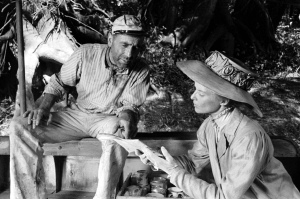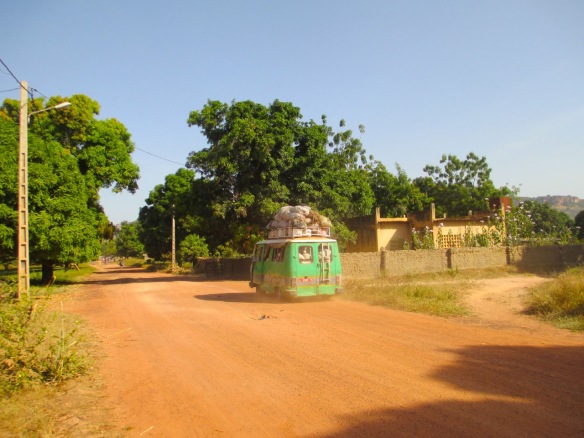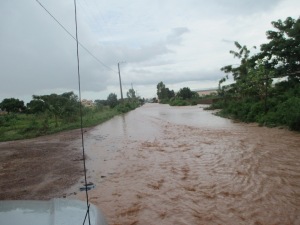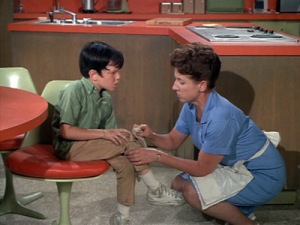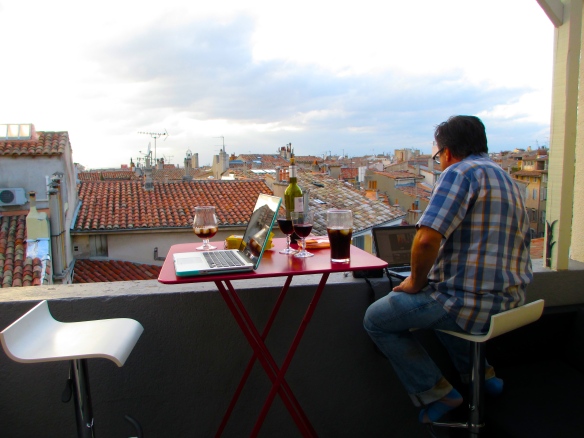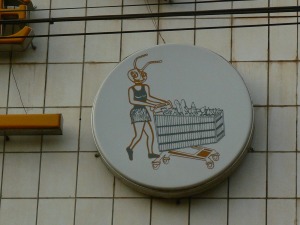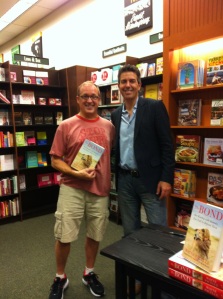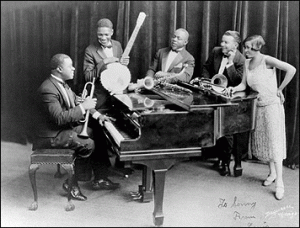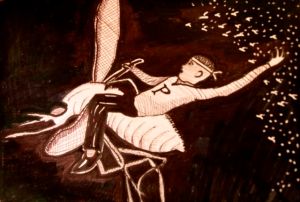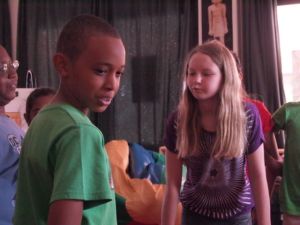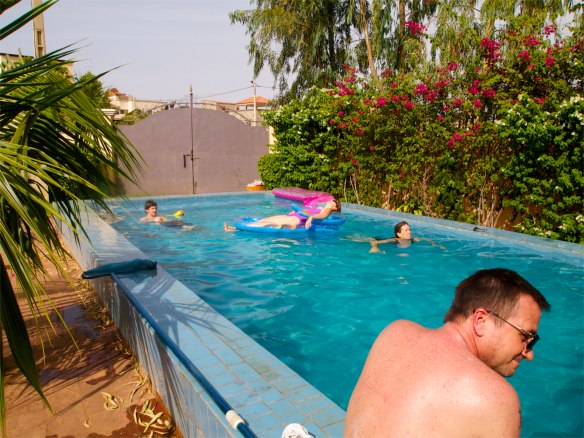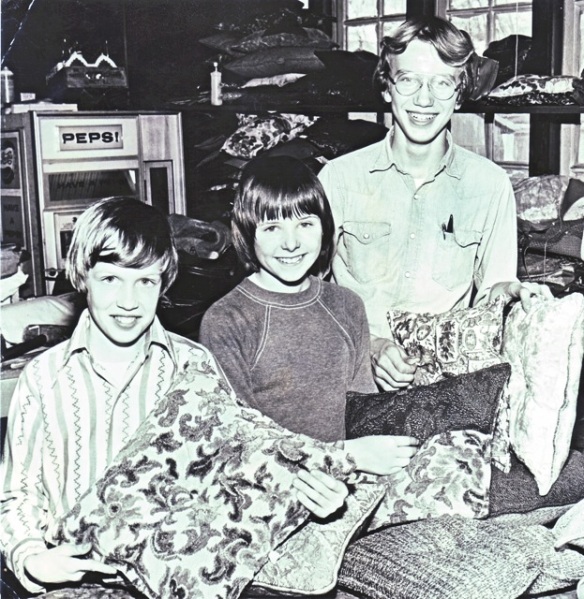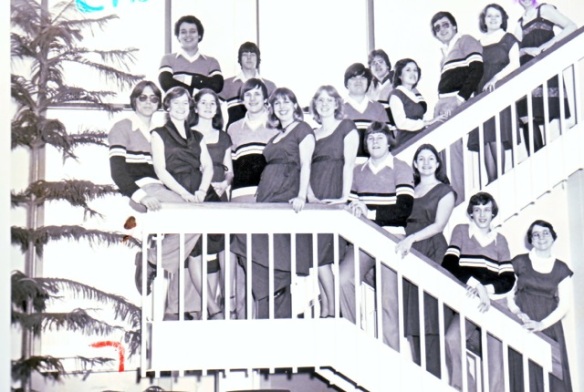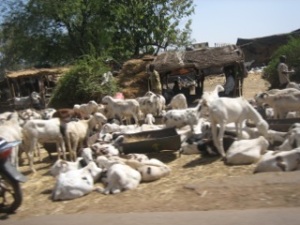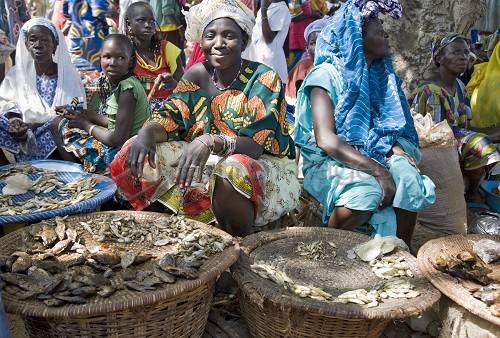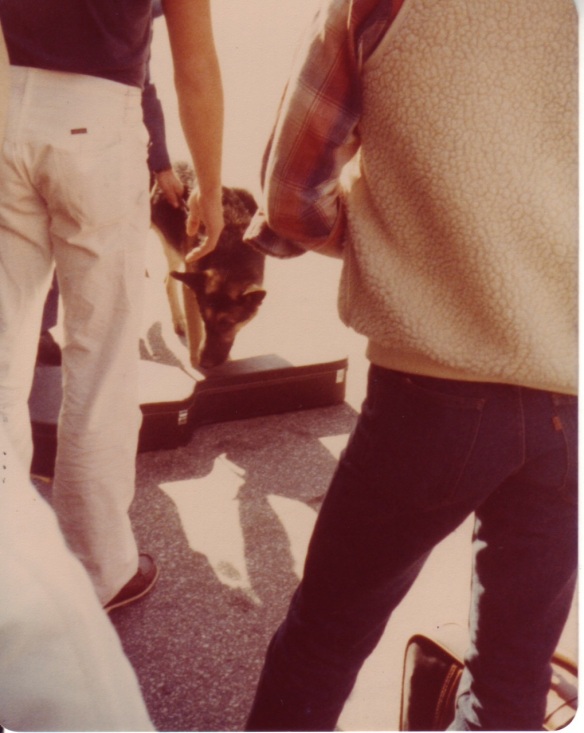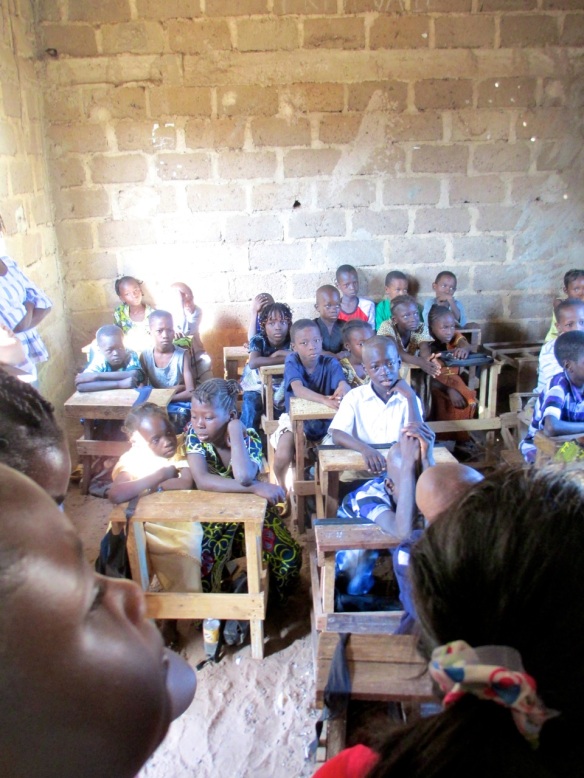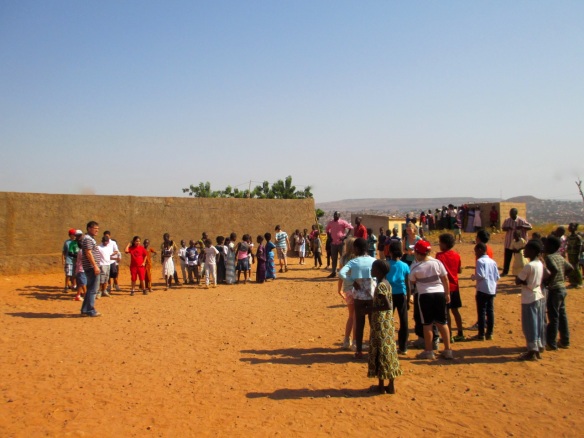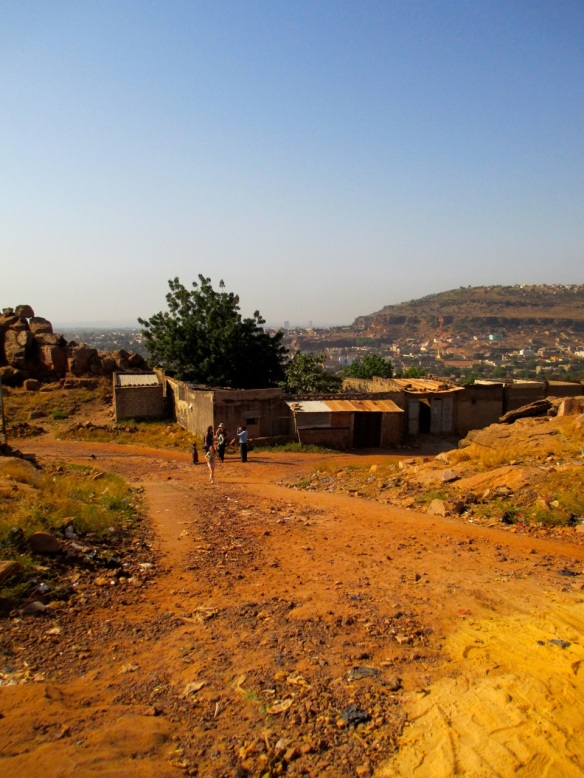As a kid I was obsessed with Africa, mostly fueled by what I saw on TV. There was the TV series Daktari starring Clarence the Cross-Eyed Lion, who made me feel both terrified and super sad at the same time (“Watch out! He’ll tear your head off with those powerful jaws…ohhhh, poor thing…what lioness will hook up with that walleyed creature?”).
There was the based-on-a-true-story movie Born Free, where we all boo-hooed when captive animal Elsa the lion is finally set free (in slow motion, of course) into the Kenyan wilds as that sappy, Oscar-winning Born Free song plays: Born free, and life is worth living, But only worth living, ’cause you’re born freeeeeeee. This is not to be confused with Kid Rock’s Born Free song in which he defiantly sings, “You can knock me down and watch me bleed, But you can’t keep no chains on me, I was born free! While technically those lyrics could apply to a freed African lion, poor grammar ruins the mood.
Kenyan wilds as that sappy, Oscar-winning Born Free song plays: Born free, and life is worth living, But only worth living, ’cause you’re born freeeeeeee. This is not to be confused with Kid Rock’s Born Free song in which he defiantly sings, “You can knock me down and watch me bleed, But you can’t keep no chains on me, I was born free! While technically those lyrics could apply to a freed African lion, poor grammar ruins the mood.
I can’t forget the classic film The African Queen where Katharine Hepburn manages to look glamorous in the Tanzanian jungles amidst the tsetse flies, high humidity, and a lack of toiletries. Glamour and jungle adventure all in one? Sign me up!
And then there was my favorite Abbott and Costello movie “Africa Screams,” where a male gorilla has a major crush on Bud Abbott and eventually saves him from being boiled up for dinner by some hungry cannibals. I used to think the whole cannibalism thing in this movie was horribly stereotypical until I read that in the 1890s the town of Ngandu in the Congo paved its streets with the leftovers from supper, in this case 2,000 polished human skulls. Oh well, they always say two (thousand) heads are better than one.
Despite the fact that I grew up in the Midwest, literally next to a cornfield, I fantasized that I lived in the wilds of Africa. The forest in the nearby park became the jungles of the Congo, and I would hack my way along the deep jungle trails with my trusty machete (well, it was part of a high rise handlebar that broke off of my Schwinn Stringray bike, you know, the one with the banana seat?). Now, I’m pretty sure that the jungles of the Congo didn’t have a Dairy Queen across the street like my jungle did, but a boy’s gotta have his Mister Misty and Dilly Bar after all of that jungle trekking.
I even wrote a story in junior high about two boys who find an old map in their algebra book and stow away to Africa in search of treasure. Clearly I was doing some daydreaming during math class. I also daydreamed about the time I rode the Jungle Cruise at DisneyWorld, my nirvana. A ten-minute dose of pygmies, pythons, and gorillas, all while gliding along a refreshingly clean “river” with our experienced African guide (actually, an 18-year old high school dude named Jason from Fort Wayne, Indiana wearing a pith helmet). What more could an Africa-obsessed kid crave?
So imagine my delight when I first actually stepped foot on the African continent, on a big detour during a college-era backpacking trip through Europe. Four of us had just arrived in Athens, saw a poster advertising cheap flights to Cairo, and within two hours were at the airport—despite the fact we didn’t have a visa for Egypt. After a weird chat with authorities at the Cairo airport in which we signed some papers that were all written in Arabic that might/might not have promised them my firstborn or my corneas, we were allowed in.
We enjoyed a weeklong adventure exploring the pyramids, riding camels in the desert, and learning that inexpensive, hole-in-the-wall restaurant food, while economically sensible, can cause explosive diarrhea two days later. But I was in Africa. AFRICA! It was as exotic and every bit as exciting as the Jungle Cruise, even though the Nile river water seemed a bit cloudier than the Disney “river.” But despite our watery stools, it was one of the best experiences of my life.
Some years later I got to experience Africa yet again. This time Jamey and I traveled to Morocco for a few weeks on a tour around the country, wandering the souks of Marrakesh, having tea with a Berber family in the Atlas Mountains, and seeing the hotel where the Marx Brothers filmed A Night in Casablanca. It was also here that we learned that Humphrey Bogart’s classic film Casablanca was not filmed in Casablanca, but rather in the exotic locales of Burbank and Van Nuys, California. Here’s lookin’ at you, California kid.
But it wasn’t until three and a half years ago that the idea of living in Africa presented itself to us. By that point we had abandoned hopes of continuing our teaching career in America, which had become about as pleasant as swallowing a mouthful of sulfuric acid-coated glass shards. Instead we were looking for international teaching jobs that would take us far, far away from the test-obsessed mess in the U.S. While there were international teaching jobs available in many countries, two openings fitting our exact skills popped up at a school in Bamako, Mali.
Mali! We pictured ourselves in pith helmets and khaki jackets, just like Jason the Jungle Cruise guide. We saw ourselves living in this exotic place of golden sands that was once home to a grand kingdom twice the size of France–so wealthy it made European royalty look like trailer park trash. We emailed the school and interviewed by Skype a few times, and after a couple of months received the news that we were hired. Surprisingly, safari fashions were not part of the conversation, but we were thrilled just the same to know we would soon be living and working in the exotic lands of West Africa.
Now granted there were a few bumps in the road in our journey. And by bumps I mean those speed bumps at the rental car places that are covered with sharp iron spikes. Because just a month after signing our contract Mali experienced a coup d’état, then a counter coup. The school closed, and we were offered the chance to cancel our contracts. But then it reopened and we went to Mali anyway because really, we figured, how much worse could it get?
Well, maybe a little worse. Within a couple of months Islamist rebels took over the northern half of the country, followed by a massive intervention by the French Army (who, by the way, wear really, really short camouflaged shorts). In the two years that followed there was a terrorist attack at a nightclub in Bamako, as well as an outbreak of Ebola. But other than that, things were dandy.
Aside from the troubles and a fluctuating student population that waxed and waned

Who wears short shorts, we wear short shorts, if you dare wear short shorts, Nair for short shorts… Source: http://ricorant.blogspot.com
depending on which countries evacuated their people, and the security advisories from the American Embassy cautioning us to avoid lots of places, we loved just about every minute of our time in Bamako. I realize that probably makes a few folks shake their heads, along the same lines as “Other than that Mrs. Lincoln, how was the play?” But believe me when I say that Mali is so much more than rare viral outbreaks and military skirmishes in the desert by short shorts-wearing men. These will not be my takeaways from three years in Mali (okay, maybe I’ll remember those crazy short shorts).
So what will I take away from our three years living and working in Mali? What will I fondly remember? Here’s what:
The Colors
Nothing is dull-colored in Mali. Everything from the clothes to the carrots dances with vivid color. Even the dirt is fabulous, a sort of earthy orange hue that would look great on the walls of a Parisian apartment or on a gown going down the catwalk. Actually most of our light-colored clothes and linens turned this shade of orange, so we really will remember this tone for years to come.
The People
We had to arrive at school early because it took at least ten or 15 minutes to get through the greetings and joking with the school guards at the gate. Sure, there were teachers who blew right past these guys with a clipped “bonjour,” but they missed out on one of my favorite parts of the day. This is when we learned to speak rudimentary Bambara, including the basic greeting that can take about five minutes (How are you? How did you sleep? How is your family? How is the village chief? And so on).
This is the time where we began to comprehend the Malian sense of humor, in which they make fun of you but you don’t really feel insulted because they are so damn nice and have the most genuine smiles ever (“Your belly looks big. Did you eat everything in the house?” or “You look tired. Too much whiskey last night?”). We bonded with these guys, and plenty of the other local staff who we took the time to get to know, and saying goodbye to them was heart-wrenching.
We once visited a remote village with a colleague and his Malian friend who originally came from this village. Even though the villagers didn’t know us and we weren’t exactly dressed well (sorry Katharine Hepburn) we were treated like VIPs, always offered the good seat in the shade along with a welcome speech about how they felt so privileged to have us there. We even met the chief who welcomed us and told us we could return any time. Throngs of kids followed us as we walked back to our car. All I could think of was, “So this is what it’s like to be a member of One Direction!”
The Expats
It takes a certain kind of person to knowingly choose to live in a landlocked, developing, sub-Saharan country where kids still poop in the road and shirts are sold from tree limbs on the roadside, where embassy advisories pop up on our phones warning us to steer clear of public places. These are people with a sense of adventure, a bit of grit, an intense interest in culture, a humanitarian spirit, lots of passport stamps, and definitely a touch of insanity. And I loved meeting every one of them.
We met a UN filmmaker who shot a documentary about artists in Afghanistan. A former colleague organizes music festivals in remote areas of Mali in order to promote peace among different tribes. Another friend worked with transgendered prostitutes in various countries around the world. We met male and female Marines who, still in their 20s, have already worked in several countries most people couldn’t point out on a map. We even socialized with the US Ambassador and the British Deputy Chief of Mission.
The Weather
There really should be a TV show about the weather in Mali (hey, there are shows called “Treetop Cat Rescues” and “Wives With Knives,” so a meteorological-based Mali program isn’t too farfetched). The wet season involves torrential downpours that dump so much rain in an hour or two that if there actually were storm drains they couldn’t handle it. So the roads turn into rivers–I actually saw fish swimming down on our “street” one afternoon. The hot season is so blistering hot and dry that it sucks the moisture from your eyes and makes blinking a chore. On the bright side (pun intended), it’s nearly always sunny so you are always cheerful as you slowly melt into the pavement. Surprisingly I must have adapted to the climate because a few weeks I actually found myself saying, “No, it’s not that hot. it’s only 100.” I guess to me, 100 degrees is the new 80 degrees.
The Arts
We took an African dance class our first year in Bamako, practicing on a patio outside our school, overlooking the Niger River, with live drummers who pounded away like there was no tomorrow. In our own minds we moved like the newest members of the Alvin Ailey 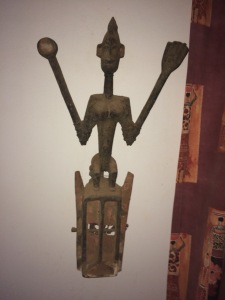 American Dance Theater; in reality we looked like two guys with some sort of nerve damage. But it didn’t matter because we were having fun and feeling a part of the culture—a culture that is steeped in the arts. We saw just about every top Malian musician in concert (Habib Koite played at one of our school’s graduation ceremonies), watched puppet shows, learned how to decorate mud cloth, and purchased enough masks and pottery and statues to open our own museum.
American Dance Theater; in reality we looked like two guys with some sort of nerve damage. But it didn’t matter because we were having fun and feeling a part of the culture—a culture that is steeped in the arts. We saw just about every top Malian musician in concert (Habib Koite played at one of our school’s graduation ceremonies), watched puppet shows, learned how to decorate mud cloth, and purchased enough masks and pottery and statues to open our own museum.
House Calls
Does the cat need shots? Car need a tune up? Feel like buying some Malian crafts? If so, keep your lazy butt on the couch because in Bamako everyone makes house calls, from the vet, to the mechanic, to the crafts guy. I did go to a dental office to get a root canal because I didn’t want blood and saliva to get on the couch.
The Simplicity
Bamako has a couple of million people, but is still referred to as a “big village.” I would add a “big DUSTY village.” There is about one high-rise building, and not many stoplights or  sidewalks or paved roads. On the other hand there are plenty of farm animals gallivanting around the city, and you can buy most of what you need at the roadside. It’s a busy, crowded sort of place, but uncomplicated and not stressful.
sidewalks or paved roads. On the other hand there are plenty of farm animals gallivanting around the city, and you can buy most of what you need at the roadside. It’s a busy, crowded sort of place, but uncomplicated and not stressful.
Sure there are a gazillion vehicles/animals/people in the road, but you seldom move faster than 25 MPH. So it never feels like a crazy death-defying ride down I-95 like I was used to, with obnoxious drivers two inches from my bumper, honking at me to go faster when I was already ten miles over the speed limit. If you’re trying to pull onto a busy road in Bamako, people actually stop their cars and flash their lights to let you in.
Nothing seemed to rattle my Malian friends. If I was fried at the end of the day from trying to accomplish too much and not getting everything done, they would say: “Dɔɔnin-dɔɔnin, kɔnɔnin bɛ a ɲaa da.” (Little by little, a bird builds its nest). When the war in the north was raging and we were preparing “to go” bags in case of evacuation, they just said things like, “That’s life” and “It will all work out.” When our plane was delayed for hours and I paced the airport trying to find out what was going on, the Malian passengers stretched out across three seats and slept. I rarely heard a Malian complain, except for my janitor at school who felt the school cat didn’t deserve the canned food and imported Whisker Lickin treats I gave her because “she doesn’t really do any work.”
The Adventure
Listen, I won’t lie: Jamey and I like fancy places too. Provence in the south of France is divine…we enjoyed buying lilies at the outdoor flower market and eating at swanky sidewalk cafes and buying lavender soap and very expensive suede shoes (that did not work well in the aforementioned hot season in Mali). Venice was enchanting as we strolled over the Bridge of Sighs with a gelato and drank wine in Piazza San Marco and watched the gondolas drift by on the Grand Canal. Barcelona, Lisbon, Berlin, Budapest, Vienna, Paris…we’ve visited many proper cities and had enjoyable times.
But unless you are Jason Bourne being chased through Europe by CIA operatives and Interpol, these fancy places don’t involve a whole lot of adventure. You eat good food, you see pretty churches, you visit an art museum with Picassos and Monets. Pleasant, but for me not so memorable.
That’s why Mali struck such a cord with me. A simple Saturday drive through Bamako to the grocery store was more memorable than any stroll down the Champs-Élysées or the Ramblas. Right in the center of town a herd of longhorn cattle might cross the road in front of your car (which makes a unique excuse as to why you are late to something).
We always played played “What’s on the Moto?” in which we tried to find the most bizarre
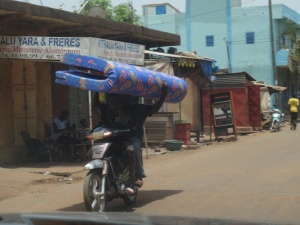
photo credit: https://gerguinea2014.wordpress.com/
thing being carried on a moto, the small motorcycles that inundate every road in Bamako. Some of the contenders:
- A guy driving his moto with three tires over his body (I think Wile E. Coyote did that once)
- two guys carrying three live sheep (a very interesting ménage à cinq)
- a guy carrying a 20-foot-long metal pipe (jousting never goes out of fashion)
- a guy clutching a large pane of sheet glass (what could possibly go wrong?)
- a guy balancing a 55-gallon steel drum on the seat behind him
You might also have an encounter with a Malian police officer in his royal blue shirt and  jaunty black beret. If you’re new to town and stupid like we were, you actually pull over when they blow their whistle at you. Then you go through a long, drawn out ordeal in which they take your auto registration card, you tell them you don’t speak French, they speak louder and more forcefully, they mention that you can pay a “fine” on the spot to avoid a trip to the station, you try to figure out why they pulled you over in the first place, you call the American Embassy and hand the phone to the officer, he yells some more, he walks away with your registration card and phone, you get out and chase after him, and he either tells you to leave or you give him a couple of dollars.
jaunty black beret. If you’re new to town and stupid like we were, you actually pull over when they blow their whistle at you. Then you go through a long, drawn out ordeal in which they take your auto registration card, you tell them you don’t speak French, they speak louder and more forcefully, they mention that you can pay a “fine” on the spot to avoid a trip to the station, you try to figure out why they pulled you over in the first place, you call the American Embassy and hand the phone to the officer, he yells some more, he walks away with your registration card and phone, you get out and chase after him, and he either tells you to leave or you give him a couple of dollars.
What’s more convenient is to pretend you don’t see or hear the policeman at all, and just blow right on past him. It feels very Bonnie and Clyde, without the machine guns, thankfully. Speaking of guns, my first taxi ride in Bamako had four of us smashed in the back along with a Malian soldier in the front seat, his gun over his shoulder and pointing pretty much at my head. Every time we hit a bump in the road (in other words, every 3 seconds), I cocked my head in another direction to avoid an accidental discharge. All that adventure for a $1 taxi fare.
Adventure is at every turn in Bamako….a village on an island in the middle of the Niger River, right in the middle of town, that makes you feel you went back in time. A boat ride  on the Niger in a pirogue loaded with cold beer, seeing people living in corrugated metal shacks next to mansions along the shore. Shopping at the Grande Marche outdoor market, a never-ending maze of stalls full of locals buying and selling everything from colorful fabric to toothpaste to soccer balls to warthog heads. Musical concerts in which
on the Niger in a pirogue loaded with cold beer, seeing people living in corrugated metal shacks next to mansions along the shore. Shopping at the Grande Marche outdoor market, a never-ending maze of stalls full of locals buying and selling everything from colorful fabric to toothpaste to soccer balls to warthog heads. Musical concerts in which  an audience member always jumps on stage to dance with the musicians and the rest of us are on our feet dancing right along. Hippos. Crocodiles. Having a sheep ritually slaughtered for Tabaski right outside my classroom window. Massive peace rallies. Outdoor parties in the sweltering heat where your clothes are soaked with sweat but you dance anyway. Malian puppet shows where massive, bigger-than-life creatures dance to the beat of African drums. A horse and rider galloping down the main road, dodging the cars and trucks. Boarding your plane from a stairway from the tarmac like they did in the 1950s. Standing under a tall waterfall in the bush just outside of the city.
an audience member always jumps on stage to dance with the musicians and the rest of us are on our feet dancing right along. Hippos. Crocodiles. Having a sheep ritually slaughtered for Tabaski right outside my classroom window. Massive peace rallies. Outdoor parties in the sweltering heat where your clothes are soaked with sweat but you dance anyway. Malian puppet shows where massive, bigger-than-life creatures dance to the beat of African drums. A horse and rider galloping down the main road, dodging the cars and trucks. Boarding your plane from a stairway from the tarmac like they did in the 1950s. Standing under a tall waterfall in the bush just outside of the city.
I like pretty, but I like adventure more.
Au revoir, Mali. K’an bεn. Thank you for fulfilling my childhood fantasy and better yet, for making me a better person. Until we meet again…


